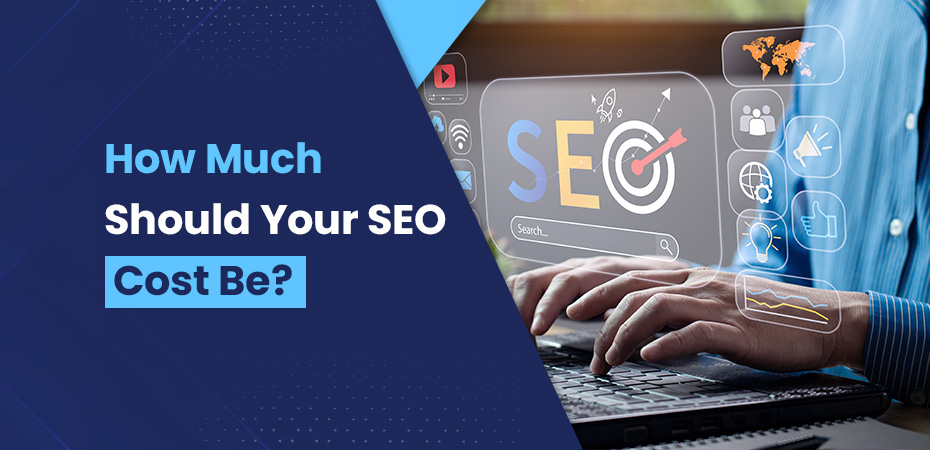How Much Should Your SEO Cost Be?



Deciding how much to spend on SEO services can be tough for any business. With so many options and prices available, it’s important to figure out the right budget for your specific needs. Various factors, like SEO pricing and the details of SEO marketing costs, play a role in what you should expect to pay. Whether you’re considering affordable SEO services or wondering if paying more for link building leads to better results, businesses have to choose wisely.
This guide breaks down how different SEO service costs, from local SEO pricing to overall optimization pricing, affect your strategy and helps you determine the best budget for growing your business online.
Understanding the Cost of SEO Services
Investing in effective Search Engine Optimization (SEO) strategies involves understanding the various factors that influence the cost of SEO services. The pricing can vary significantly, depending on the business size and specific needs.
1. General Pricing Ranges for Different Business Sizes
Monthly Spending Breakdown
- Small Businesses: For many small businesses, SEO optimization costs typically range between $1,500 and $5,000 per month. This budget often covers essential services like keyword research, content optimization, and local SEO efforts which are crucial for gaining visibility in local searches.
- Larger Enterprises: Larger companies or those undertaking more comprehensive projects might spend between $2,501 and $10,000 per month or more. This increased investment often allows for a broader range of services including technical audits, expansive content marketing strategies, and sophisticated link-building campaigns.
Hourly Rates for SEO Professionals
SEO professionals generally charge between $100 and $300 per hour, affecting how businesses structure their SEO budgets. Here’s what to consider:
- Cost Implications: Hourly SEO rates provide flexibility for short-term projects or consultations. They can quickly add up if ongoing support is needed over months, making monthly SEO services and retainers a more cost-effective choice for continuous engagement.
- Strategic Considerations: Businesses must weigh whether these hourly costs align with their strategic goals and expected outcomes. For instance, a small business might opt for a few hours of consulting to get specific advice without committing to a full-scale monthly SEO package price.
Understanding these pricing dynamics helps businesses allocate their SEO budget effectively, ensuring they get value from their investment in search engine optimization. By aligning spending with business size and objectives, companies can better navigate the landscape of SEO services.
2. Factors Influencing Costs in SEO Projects
Understanding the cost of SEO services involves recognizing various factors that influence pricing. One major factor is the complexity of the project. Different industries have unique challenges and requirements which can significantly affect costs.
Project Complexity and Industry Examples
In highly technical industries, such as software development, SEO strategies often require deep keyword research and technical optimization, which can increase expenses.
E-commerce platforms may need extensive content marketing and link-building efforts, leading to higher budget allocations.
Another critical aspect influencing costs is the scope of the campaign—whether it’s local or national.
Local vs. National Campaigns
Local SEO services and campaigns generally focus on optimizing visibility within specific geographic areas. This approach often involves managing Google Business Profiles and local listings, usually incurring lower costs compared to broader campaigns.
Broader campaigns targeting national or international audiences require a more comprehensive strategy, including extensive keyword targeting and widespread link-building efforts. These demands typically result in higher expenses.
Industry competition also plays a crucial role in determining search engine optimization costs.
Competition in SEO
Industries with fierce competition like real estate or legal services demand aggressive SEO strategies to stand out, thus increasing budgets.
Conversely, niche markets with less competition might see lower SEO expenses due to reduced demand for intensive strategies.
Investing in effective SEO strategies is essential for any business aiming for long-term success in digital marketing. The SEO budget should reflect not only the business size but also these influencing factors to ensure optimal returns. Understanding these elements helps answer the question: How Much Should You Spend on SEO?
Budget Recommendations for Effective SEO Spending
1. Percentage Allocation Method: CMO Survey Insights
Understanding how much to allocate for SEO requires a strategic approach, especially when looking at the best practices for allocating revenue towards SEO efforts. One effective method is the Percentage Allocation Method, which offers a structured way to budget based on industry standards.
CMO Survey Findings
According to insights from the CMO Survey, businesses are encouraged to allocate a specific percentage of their total revenue toward digital marketing strategies like SEO. Typically, this percentage ranges from about 5% to 10%. This range allows businesses to invest adequately in search engine optimization without overextending their resources.
Industry Standards
The recommendation of dedicating 5% to 10% of revenue isn’t arbitrary. It stems from comprehensive analyses of market trends and business needs, ensuring that companies remain competitive while effectively reaching their target audience online. For example, a small business generating $500,000 annually might consider setting aside between $25,000 and $50,000 for SEO services annually.
Benefits of Adhering to These Guidelines
- Sustainable Growth: By consistently investing in SEO, businesses can achieve sustainable growth in organic traffic and online visibility.
- Adaptability: A flexible budget within this range allows companies to adjust their strategies as needed, responding dynamically to changes in the digital landscape.
- Competitive Edge: Companies adhering to these spending guidelines often outperform competitors who may underinvest in SEO.
The guidance provided by the CMO Survey on digital marketing spending underscores the importance of intentional budgeting for SEO initiatives. Businesses that adopt these recommendations typically find themselves better equipped to leverage SEO as a powerful tool for achieving long-term success.
2. Tailoring Your Budget to Business Goals and Objectives
It’s important to match your SEO budget with your specific business goals to get the most out of your marketing efforts. Companies should think about the best ways to spend their revenue on SEO. For example, a business wanting to raise brand awareness might invest more in content creation and technical SEO, while a company aiming to improve its local presence might focus on local SEO strategies.
When deciding how much to invest in SEO, consider both the long-term benefits and the immediate results. Investing in strong, sustainable SEO can lead to significant advantages over time, such as better visibility and higher search rankings. Even though these results may take months to show, they often provide a better return on investment than quick wins.
The CMO Survey on digital marketing spending offers helpful guidelines for allocating funds to SEO. Experts suggest setting aside money for ongoing optimization and updates that reflect changing industry trends. By taking advice from industry professionals and weighing short-term goals against long-term growth, businesses can make smart choices about their SEO costs.
In short, tailoring your budget means aligning it with clear business goals while considering both immediate results and the lasting benefits that effective SEO strategies can bring.
Types of Pricing Models Available in the Market
1. Monthly Retainers vs. One-Time Projects: Pros and Cons
When deciding on SEO service pricing, businesses can choose between monthly retainers and one-time projects. Each option has its own set of benefits and cost considerations.
Monthly Retainers
- Sustained Support: Monthly retainers provide ongoing support and maintenance, ensuring that your SEO strategy adapts to changes in algorithms and competitive landscapes.
- Consistent Results: With continuous optimization, businesses can achieve more consistent results over time. This approach is beneficial for those aiming for long-term growth in search engine rankings.
- Budget Predictability: Fixed monthly SEO fees allow for easier budget planning, reducing unexpected expenses.
- Comprehensive Services: Retainers often include a package of services of SEO that is affordable such as keyword strategy, content updates, link-building efforts, and performance reporting.
One-Time Projects
- Cost Flexibility: Ideal for businesses with specific goals or limited budgets, one-time projects provide flexibility. The scope and complexity determine the overall cost, which can range from $5,000 to $30,000.
- Focused Efforts: These projects are usually tailored to tackle particular issues or launch new initiatives like site audits or redesigns.
- Short-Term Results: While effective for immediate needs, one-time projects may not sustain long-term benefits without further investment.
Choosing between these models depends on the business’s objectives and resources. For those seeking ongoing growth and adaptability, monthly retainers may be advantageous. In contrast, businesses with specific tasks or budget constraints might opt for one-time projects.
In both cases, understanding your priorities helps tailor the choice to align with your goals. Engaging with an SEO provider who offers transparent pricing models ensures that you are well-informed about the potential outcomes of your investment.
2. Hourly Consulting Options: When to Consider Them?
Hourly consulting options provide flexibility for businesses needing targeted SEO efforts without committing to long-term contracts. These google SEO services can be particularly useful when:
- Specific Expertise is Needed: If your business requires specialized skills for a short-term project, such as a technical audit or content strategy, hiring an SEO professional based on hourly rates can be a cheap search engine optimization service option.
- Budget Constraints Exist: For startups or small businesses with limited budgets, hourly consulting allows for precise spending control. This option enables you to allocate resources only when necessary.
- Project-Based Work: When the scope of work is narrow and well-defined, hourly consulting offers an efficient way to get expert input without the ongoing commitment of monthly retainers.
Advantages of Hourly Consulting
- Flexibility in scheduling and budgeting
- Access to expertise as needed
- Disadvantages of Hourly Consulting
- Potentially higher costs if not managed properly
- Lack of consistent, ongoing support compared to fixed contracts versus monthly retainers
Understanding these aspects helps in deciding how much you should spend on SEO by aligning project needs with the right pricing model. Whether it’s fixed contracts or ongoing support and maintenance through monthly retainers, knowing when to choose hourly rates ensures strategic allocation of resources.
Expected ROI from Your Investment in SEO Strategies
Investing in SEO strategies can lead to significant business growth, but understanding when results may appear is crucial. Typically, businesses start seeing tangible outcomes from effective SEO efforts within 6 to 12 months. This timeline reflects the gradual nature of building a strong online presence and achieving higher rankings on search engines.
When comparing SEO with other marketing channels, it’s important to note that organic search often boasts higher conversion rates. Businesses should prioritize organic search optimization due to its potential for sustained visibility and long-term value. Unlike paid ads that stop driving traffic once the budget runs out, well-optimized content continues to attract visitors over time without ongoing costs.
Evaluating the potential impact of SEO on business revenue growth involves considering both short-term gains and long-term benefits. As a cost-effective strategy, SEO not only enhances brand credibility but also drives more qualified traffic, leading to increased sales opportunities and customer engagement. Investing in SEO is not just about immediate returns; it’s about cultivating a robust digital footprint that supports business goals over time.
Conclusion
Investing in SEO is not just about spending money but aligning your budget with expected outcomes while considering long-term benefits over short-term gains. How much should you spend on SEO? It depends on your business goals, industry competition, and desired results.
Take proactive steps towards optimizing your online presence through strategic investments. Avoid relying solely on cost-cutting measures, and instead prioritize quality standards set by reputable agencies specializing in search engine optimization.
To explore how our tailored solutions can support your unique requirements, reach out directly via the contact form below. We’re here to help deliver sustainable results that align with your business objectives.